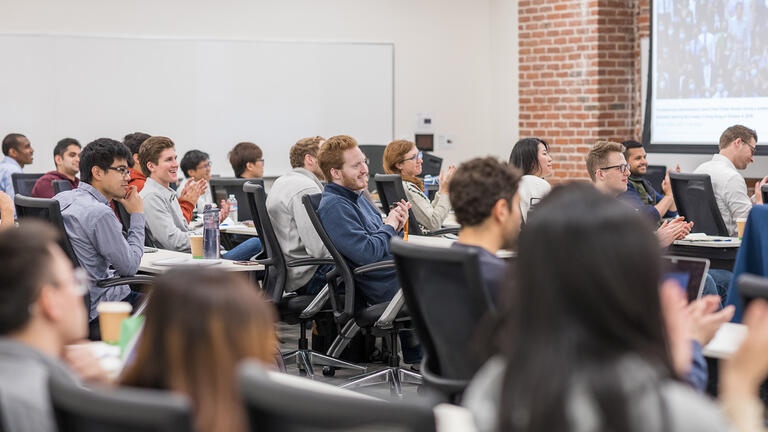
Data Institute Certificates
Discover what drives the world’s most powerful AI and data technologies.
Gain practical, career-ready expertise through certificate courses at the University of San Francisco’s Data Institute. Learn from USF faculty and industry experts from leading tech companies. Programs are designed for professionals and students who want to build or deepen their data and AI skills.
Expand your knowledge. Accelerate your career. Learn more at the USF Data Institute.
Spring 2026 Certificate Programs in Data Science & AI
- Python for Data Analysis (Feb 4 - Mar 18): Learn to write and test Python code to solve real-world data problems. Practice working with data structures and libraries such as NumPy, Pandas, and Matplotlib to prepare, analyze, and visualize data effectively.
- Introduction to Machine Learning (Feb 19 - Apr 2): Understand the core principles that guide modern machine learning. Explore techniques such as logistic regression, decision trees, and clustering, while learning how to validate and evaluate model performance.
- Fundamentals of Mathematical Foundations for Data Science (Feb 19 - Apr 2): Develop fluency in the core mathematical concepts behind data science and machine learning. Explore calculus, linear algebra, and optimization techniques that form the analytical base for advanced AI and technical studies.
- SQL for Data Analysis (Mar 3 - Apr 14): Gain practical experience extracting, transforming, and managing data using SQL. Learn to write, debug, and optimize queries while understanding key principles of relational databases and data design.
- Introduction to Probability & Statistics (Mar 24 - May 5): Build a strong foundation in statistical reasoning for data and AI applications. Learn how to analyze variability, make predictions, and interpret real-world data to support evidence-based decision-making.
- Chief AI Officer (March 25-27): Develop the strategic, technical, and organizational leadership required to guide enterprise-wide AI transformation. Learn how to define an AI vision, build governance and operating models, align teams and resources, and translate emerging capabilities into measurable business impact. Gain practical frameworks to oversee responsible adoption, manage risk, and lead cross-functional initiatives that position your organization for long-term success in an AI-driven economy.
- Fundamentals of Deep Learning (Apr 16 - May 28): Get hands-on experience building deep learning models with PyTorch. Learn how neural networks power applications in computer vision, natural language processing, and recommendation systems.
- Data Science for Marketing (Apr 22 - June 3): Use statistical and machine learning techniques to generate insights that drive marketing strategy. Apply Python to real datasets and master tools like correlation analysis, regression, segmentation, and forecasting.
- Secure LLM Implementation (Dates TBD): Build the skills leaders need to deploy large language models safely, responsibly, and at scale. Learn how to assess enterprise risks such as data leakage, model poisoning, and compliance gaps, and apply governance frameworks that strengthen security across the AI lifecycle. Gain practical tools for evaluating vendors, guiding technical teams, and implementing secure, resilient LLM systems within your organization.
2026 Summer Intensive Certificate Program in Agentic AI
- Applied Agentic AI (June 15-24): Learn how AI agents think, communicate, and make decisions as you design and build your own simple agents using beginner-friendly tools. Through hands-on labs, industry workshops, and a final Hackathon, you will practice constructing and evaluating agentic systems and earn a certificate upon completion.
Additional Certificate Programs
- Advanced Python for Data Analysis: Learn to use Python’s core data science libraries including Pandas, NumPy, JupyterLab, and Matplotlib to efficiently clean, analyze, and visualize data for real-world insights and decision-making.
- AI & Data Ethics: Examine pressing issues in AI and data ethics, including bias, privacy, surveillance, and the societal impacts of automated decision-making. Learn frameworks for building fair and responsible data systems.
- Applied Graph Neural Networks: Gain hands-on experience with Graph Neural Networks and master the skills needed to apply this powerful machine learning technique to real-world, cutting-edge applications.
- Digital Marketing Analytics: Master the skills to analyze marketing data, apply AI-driven insights, and implement data-informed strategies that optimize performance and fuel business growth.
- Generative AI for Coders: Learn to build and apply generative AI models through hands-on coding projects that enhance software development, enable creative innovation, and solve complex real-world problems.
- Large Language Models for Coders: Explore how generative AI systems like GPT work under the hood. Learn practical approaches to fine-tuning and deploying large language models for coding and automation tasks.
- Machine Learning Operations: Learn to build, deploy, and manage machine learning systems that bridge the gap between model development and real-world production, optimizing AI workflows and advancing your ML career.
- Practical Deep Reinforcement Learning: Gain hands-on experience applying deep reinforcement learning with PyTorch to real-world challenges in robotics, healthcare, supply chain optimization, and beyond, building the skills to design and deploy advanced AI systems.